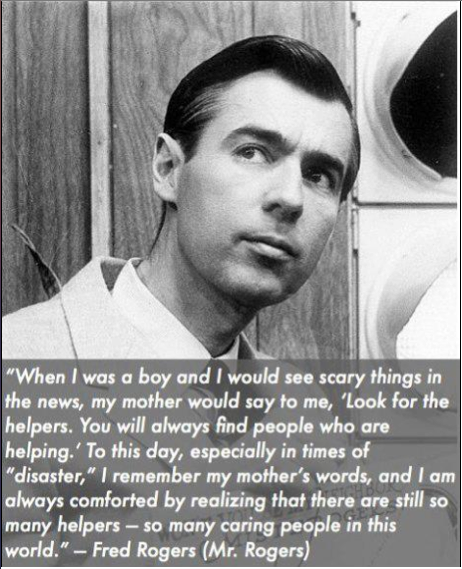The second I saw those big pink balloons in early images flooding media from the Manchester Arena last night, without knowing a single other thing about the story, I thought, Oh my God…whatever happened, there are children there.
It was a rough night for me, as I’m sure it was for all of you, and for parents around the world.
It’s hard enough for us to process our own feelings as parents and as caring human beings when we hear about a terrorist attack, especially one that’s impacted so many children and families — let alone knowing we’re also going to have to help our children with their own questions, concerns and feelings too.
This is the part of parenting that no one tells you about in L&D.
I thought breastfeeding was hard? Please. I never imagined having to look down at my daughter’s wide, curious eyes through the years, having to answer the same troubled question: But why, Mom? Why?
Oof.
We’ve posted so many articles with tips on how to talk to children about tragedy, and specifically terrorism, and the best resources to help you talk about tragedies with kids, whether a horrific natural disaster or a senseless terror attack like the one in Manchester Arena. And honestly, I always refer back to those very tips myself.
In fact, the first thing I reminded my kids last night (if through tears) was to look for the helpers.
 via @wtvrkatelyn on Twitter
via @wtvrkatelyn on Twitter
I described some of the stories on social media about happy reunions with children who had been separated from friends and family, or the generous adults and nearby hotel owners who were opening their doors to the crowds.
Then it lead to a discussion about what to do if we’re ever separated in a crowd.
Turn out that a lot of us at Cool Mom Picks were having that very same conversation with their own kids last night.
This morning, as we discussed it around our virtual water cooler, we thought it would be helpful to share tips on what to do if you’re ever separated from your children and how to hopefully avoid it happening in the first place.
Because one of the best things we can always do is to help our children feel empowered, so that if they ever are in a dangerous or scary situation — of any kind — they feel they have the tools and resources to get somewhere they’ll feel safe.
Top photo: Florian Klauer via Unsplash
1. Make sure your kids know your phone number and address
This should go without saying, but it should be committed to memory. Not just a number in their phone’s favorites. This way if there’s ever a lack of power or cell signal, they can still get in touch with you. It’s also good for them to have a backup phone number — a second parent, neighbor, grandparent, friend’s parent.
By the way, you might consider teaching your kids how to dial 411 and get directory assistance for a landline; that way they can look up someone’s work number too.
2. Go old school with a Sharpie
Our friend Asha from the Parenthacks website and book, has recommended for years that parents use a Sharpie to scribble a name and phone number on your young child’s arm. With an older child, consider doing that in a less obvious place like higher on their arm under a sleeve or on their calf. Can’t hurt.
3. Make sure you have a second number, too
If your child is with a friend, it’s a good idea to have that friend’s phone number in your phone. This also goes for teachers on a class field trip, parents hosting a birthday party…you get the picture.
On the chance that your child’s phone runs out of power or their service goes out, at least you’ll have a backup plan for getting in touch.
4. Be sure kids know how to call 911 — and what to say when they do
All kids know about 911, but some are reluctant to call because they’re not sure what to say. Our kids really aren’t growing up in a phone world, so we shouldn’t take this knowledge for granted.
Tell your kids simply to say, “My name is Ella, I’m 9 and I have an emergency” and the dispatcher will talk them through the rest.
If they’re a little older, we have a post on what to say when you call 911, including your phone number (should the call be disconnected) and location with any identifying landmarks or details in the area — but again, the dispatcher can help children with that.
5. Set up check-in-times through phone or text
If your kids have their own phones (here are tips to know your kid is ready for their own phone, but it’s a good idea if they’re out without you frequently), hopefully you’ve already set rules about keeping in touch with you at set times.
Like my daughter always calls or texts when she leaves school, or gets to where she’s going. She’s so consistent and responsible with this, I know that I only have to panic if I don’t hear from her.

6. “Look for the helpers”
I already mentioned how Mr. Rogers’ perfectly succinct advice can help keep us hopeful during tragedies — but it’s really an essential safety tip for kids if and when they do get separated from you.
I tell my children to look for other moms first for help; and yes, I know that’s controversial and some dads, including those I really respect, feel offended by this. But you know? Too bad.
Now I’m not telling my kids that dads aren’t good and wonderful and safe and helpful people; they have many caring adult men in their own lives. I just know that overall they feel more comfortable with women, unless they know the dad personally — but you do what’s right for your kids.
Secondarily, tell your kids to look for a storekeeper, a police officer (if they can identify the difference between a real officer and someone wearing an “official” looking uniform), or someone who clearly works wherever they find themselves separated from you, whether it’s a concert arena, theme park, subway station, zoo or museum.
7. Set up a meeting spot if you’re in a crowded place together
The first time I took my kids to a Major League Baseball game, they were excited to get their own snacks (and who could blame them?) from the concession. Before I let them go, I made sure we had a designated meeting spot outside the stadium, so should there be some sort of emergency — fire alarm, evacuation, anything at all — that would separate us, they’d know where to go.
Just knowing that they had that info certainly made me less anxious about sending them off into a big stadium alone. (Also knowing they had their hands on phones at all times helped.)

Photo: Jose Martin via Unsplash
8. Keep that phone charged
I make a big deal about my kids not leaving the house with low battery power. We have a charging station in our living room where all devices must go each night.
While they’re at it, if they’re at an event alone, kids should be wary of running down their battery with videos, social media, or power-sucking apps. In fact, it’s a good idea to send them out with a battery charging case on their phone or some sort of backup power supply, as well as a charging cord.
Related: How to be prepared if your smartphone battery dies
It’s also exceptionally important to discuss NOT wasting battery power if there is some kind of emergency. I’ve been stuck on a subway that wasn’t moving for 40 minutes, realizing I had about 9% left and I was panicky about that — so just imagine how your kid would feel in that situation.
Killing time with Candy Crush is not the best idea if you think you really might need your phone.
I would also consider making a rule that they never ever use the backup power supply source for playing games or social media. That’s there exclusively for keeping your phone charged in emergencies; run down your phone power one time and that’s it for apps for the day.
9. Answer the phone. Even if you don’t recognize the number
My kids know not to answer calls from unknown numbers — but if they’re out and about, it’s possible I could be calling them from a number they don’t know. Worst case scenario, they hang up and block the number.
This goes for parents too, by the way. Half the time a call comes in from a local number I don’t recognize, it’s been the school nurse telling me someone scraped her knee again. And hopefully nothing much worse.
10. Use social media. Because we sure will.
If your kids are old enough, they should know your social media handles and be able to put out an APB for you should they be in some sort of mass emergency situation. If they’re not old enough, they can ask someone to post an alert on Twitter or Facebook, where their parents are most likely to be.
Last night featured a plethora of helpers retweeting everything from photos to emergency numbers to call.
Of course it’s more likely that if a parent and child become separated, it will not be an emergency situation
11. Have a no-phone/no-text backup plan
Should there be a blackout, a cell outage, or another situation that makes calling from their mobile phone prohibitive make sure your kids know other ways to contact you. Like asking another mom to borrow a working mobile phone, or asking a storekeeper for use of a landline in an emergency.
12. Look around, know what’s going on, trust your gut
These very words come from our own Lisa Barnes, and I’m putting them here verbatim, as she described them to their kids, because I think they’re absolutely essential.
Kids have to be taught to make an effort to be aware of what’s going on around them, which is tough when their noses are in their phones or they’re deep in conversations with friends. It’s something my kids have learned after a lifetime of riding the subway, but I still remind them all the time never to get too comfortable.
It’s also essential that kids learn to trust their instincts about situations and strangers — and to act on those instincts.
As much as I thought my kids knew this lesson, my daughter once told me about a “creepy” guy in the park with a dog who was talking to her friends. (Spoiler: He was a neighbor and not actually creepy; just not so great at making conversation with kids.) Even though my daughter was a little uncomfortable around him instinctively, she left her friends talking to him. When I asked her why, she said she didn’t want to be rude and pull them away.
Moral: BE RUDE.
It’s okay.
Any reasonable adult will understand if your child is choosing self-preservation at the expense of politeness. Which also goes back to my point about looking for a mom as a trusted adult. You can hate me for that, but I’m okay with it.
13. Remind your kids that none of this is likely
The likelihood of your child finding themselves in a mass emergency situation without an adult is incredibly small. That’s why they’re called “emergency plans.”
Remind your kids that we discuss all these things “just in case,” with the hopes that they never happen, but if they do, that we want them have the sense and the knowledge to keep themselves safe as possible. Just like knowing where fire extinguishers are. Or practicing fire drills and lockdown drills in their classrooms.
But the one thing I always tell my girls that I think is the single most important thing of all: My number one job on this planet is to keep you safe. And if you ever are unsafe, I will do absolutely everything in my power to fix that.
That’s really want we want our kids to know most.
——-
I am so grateful to Kristen, Lisa, Stacie, and everyone on the Cool Mom Picks team who are such thoughtful parents and helped with this post. And hey, if you have any other ideas that work for you and your family by all means, leave them in comments so that you can help other parents too.
Times like these, we can use all the help and support we can get.





This is an important list. If your kids call you paranoid for doing this, tell them that you are prepared, not paranoid.
One big item missing from this though is first aid training. I firmly believe that ever parent and human for that matter should know basic first aid. Teaching your kids what a tourniquet is, signs of shock, basic wound dressing and CPR are skills that we all need to know. They can be life-saving on the sports field, parking lot, hallways and anywhere an emergency situation may occur.
Thank you so much CC, that is the best line: “prepared not paranoid.”
And I love your idea for first aid training. We could all probably use a refresher since whatever we learned in Lamaze.
Love this article. Thanks for sharing. And, I agree to teach our kids first aid is so important, especially with all the frequent tragedies we experience.
It is often hard to know who is a clerk in a store, so when my kids were toddlers I would tell them to go to the cash register because that’s where the store clerks are and they will help you find mommy in the store. ‘
This is a great list. Thank you!
I live near a big city and have a code with my girls for when we’re outside and I see someone that I feel uncomfortable about. I hoot like an owl (at first our code was “cuckoo, cuckoo”, but that seemed a bit too on-the nose). Their job is to stop immediately, look around to identify who I’m concerned about, and move to me or the closest adult we’re with that they can get to safely (without, say, walking right in front of the person troubling me). If they can’t, they move away and stand still and I’ll come to them.
My kids are 10 and 12 and grown and responsible enough, but they may not notice everything even with their “city eyes” on. We probably use this at least once every time we’re in the city. They take it seriously but don’t freak out and it makes me feel safer knowing we have this mechanism.
Thanks for this post! It’s nice to feel we parents are all in it together!
That’s fantastic Audrey. So smart.
Another tip is, if you are heading somewhere busy for the day, take a photo of your kids in the morning. That was if you do get separated, you have a photo of them wearing exactly what they are wearing that you could show people or give to the police to help you find them.
That’s fantastic. (Plus, what parent among us isn’t taking pictures of our kids all the time anyway?)
Often kids don’t want to ask any questions, but they are feeling like they need more information. I applaud you for raising this and letting parents know how important it is to share the information from a source they know and trust.
Great ideas. I also tell my kids if theyre lost to ask for help from police or mommies w lots of kids. Feel like those are least likely to be dangerous adults.